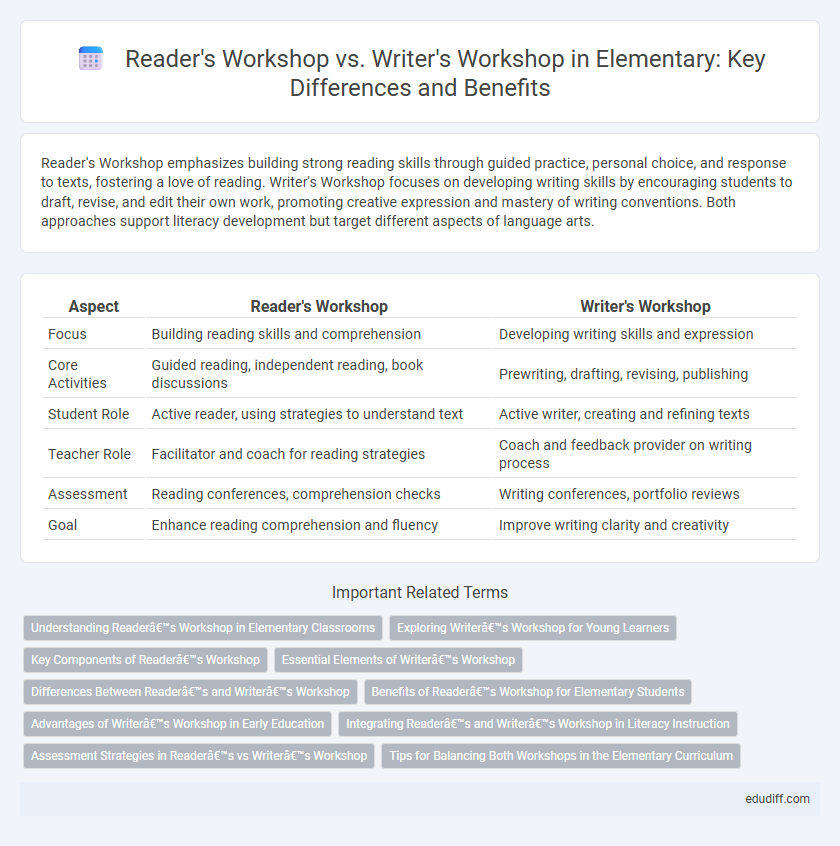Reader's Workshop emphasizes building strong reading skills through guided practice, personal choice, and response to texts, fostering a love of reading. Writer's Workshop focuses on developing writing skills by encouraging students to draft, revise, and edit their own work, promoting creative expression and mastery of writing conventions. Both approaches support literacy development but target different aspects of language arts.
Table of Comparison
| Aspect | Reader's Workshop | Writer's Workshop |
|---|---|---|
| Focus | Building reading skills and comprehension | Developing writing skills and expression |
| Core Activities | Guided reading, independent reading, book discussions | Prewriting, drafting, revising, publishing |
| Student Role | Active reader, using strategies to understand text | Active writer, creating and refining texts |
| Teacher Role | Facilitator and coach for reading strategies | Coach and feedback provider on writing process |
| Assessment | Reading conferences, comprehension checks | Writing conferences, portfolio reviews |
| Goal | Enhance reading comprehension and fluency | Improve writing clarity and creativity |
Understanding Reader’s Workshop in Elementary Classrooms
Reader's Workshop in elementary classrooms centers on developing students' comprehension, fluency, and love for reading through guided practice and independent reading time. It emphasizes strategies such as predicting, questioning, and summarizing to build critical thinking skills and foster deeper engagement with texts. Teachers facilitate discussions and use mini-lessons to support diverse reading levels and promote a growth mindset.
Exploring Writer’s Workshop for Young Learners
Writer's Workshop offers young learners a structured and engaging environment to develop their writing skills through mini-lessons, independent writing time, and sharing sessions. It emphasizes the writing process, including brainstorming, drafting, revising, and editing, which helps students build confidence and creativity. Integrating Writer's Workshop in elementary classrooms fosters vocabulary growth, storytelling abilities, and a deeper understanding of language structure.
Key Components of Reader’s Workshop
Reader's Workshop centers on key components such as independent reading, mini-lessons focused on comprehension strategies, and guided reading groups tailored to student needs. It emphasizes fostering a love for reading through choice and discussion, helping students build fluency, vocabulary, and critical thinking skills. Conferring with students to provide personalized feedback also plays a crucial role in supporting reading growth.
Essential Elements of Writer’s Workshop
Writer's Workshop centers on essential elements such as mini-lessons, independent writing time, and personalized conferring, which cultivate students' creativity and writing skills. This format encourages student choice in topics, fostering ownership and motivation to write daily. Structured sharing sessions allow peer feedback and reflection, reinforcing writing development in elementary classrooms.
Differences Between Reader’s and Writer’s Workshop
Reader's Workshop centers on developing students' reading skills through guided reading, comprehension strategies, and discussion of texts. Writer's Workshop emphasizes writing skills by engaging students in drafting, revising, and publishing their own written work. The key difference lies in Reader's Workshop focusing primarily on reading fluency and understanding, while Writer's Workshop prioritizes writing process and expressiveness.
Benefits of Reader’s Workshop for Elementary Students
Reader's Workshop enhances elementary students' comprehension skills by providing targeted strategies like predicting, questioning, and summarizing, which foster active engagement with texts. This approach promotes a love for reading through choice in book selection and individualized pacing, supporting diverse learning needs and literacy development. Frequent one-on-one and small group conferences enable teachers to offer personalized feedback, boosting confidence and reading proficiency.
Advantages of Writer’s Workshop in Early Education
Writer's Workshop in early education fosters creativity and critical thinking by giving students structured time to develop their own stories and ideas. It enhances writing fluency and vocabulary through consistent practice and personalized feedback from teachers. This approach also builds confidence and motivation as young learners see their progress and share their work with peers.
Integrating Reader’s and Writer’s Workshop in Literacy Instruction
Integrating Reader's and Writer's Workshop in elementary literacy instruction enhances student engagement and deepens comprehension by connecting reading and writing processes. Through reciprocal activities, students analyze texts to develop writing skills while using writing to reflect on reading strategies, fostering critical thinking and creativity. This integrated approach supports literacy development by promoting authentic communication and reinforcing core language arts standards.
Assessment Strategies in Reader’s vs Writer’s Workshop
Assessment strategies in Reader's Workshop often include running records, anecdotal notes, and comprehension checklists to track students' reading fluency, accuracy, and understanding. Writer's Workshop assessments focus on writing samples, rubrics for narrative and informational pieces, and conferencing notes to evaluate organization, voice, and conventions. Both workshops emphasize formative assessment to guide individualized instruction and support student growth in literacy skills.
Tips for Balancing Both Workshops in the Elementary Curriculum
Balancing Reader's Workshop and Writer's Workshop in the elementary curriculum requires integrating clear time blocks that allow focused skill development in reading comprehension and writing expression. Utilizing interactive mini-lessons tailored to specific strategies helps students apply literacy skills while maintaining engagement in both workshops. Consistent assessment and flexible grouping based on individual progress ensure differentiated instruction that supports growth in both reading fluency and writing proficiency.
Reader’s Workshop vs Writer’s Workshop Infographic

 edudiff.com
edudiff.com